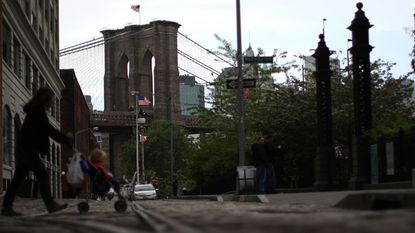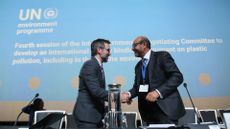Babies in prams ‘exposed to 60% more pollution than adults’
Study finds that because pollution levels are greater within 1m of ground level, infants are exposed to more of it than adults

Babies in buggies and prams could be exposed to up to 60 per cent more pollution than adults, which could negatively affect their cognitive abilities and brain development.
Researchers at the Global Centre for Clean Air Research, at the University of Surrey, carried out a review of existing scientific research and found that the breathing height of infants in prams was between 0.55m and 0.85m (2ft) above ground level.
The evidence indicates that because “pollution levels are greater within 1m of ground level, these infants are being exposed to up to 60% more fine particle air pollution than adults,” reports the BBC.
Subscribe to The Week
Escape your echo chamber. Get the facts behind the news, plus analysis from multiple perspectives.

Sign up for The Week's Free Newsletters
From our morning news briefing to a weekly Good News Newsletter, get the best of The Week delivered directly to your inbox.
From our morning news briefing to a weekly Good News Newsletter, get the best of The Week delivered directly to your inbox.
The study, which was published in the Environment International journal said that as roadside pollution contains high levels of toxic metals, this has the potential to impair brain development in infants.
Professor Prashant Kumar, one of the authors of the paper, said: “When you also consider how vulnerable they are because of their tissues, immune systems, and brain development at this early stage of their life, it is extremely worrying that they are being exposed to these dangerous levels of pollution.”
Kumar’s team suggest that a range of actions are needed to protect young children, including “‘active’ solutions such as controlling emissions of road vehicles, and ‘passive' actions such as placing roadside hedges between vehicles and pedestrians”, reports Canadian news site CTV.
Kumar added: “With the multitude of evidence we set out in this review, it is important that everyone across the country begins a full and frank conversation about pollution and the impact it has on our most vulnerable - from parents and community leaders, to government officials and industry.”
According to Unicef, 17 million children under the age of one across the world live in regions where air pollution levels exceed World Health Organisation-recommended guidelines.
Professor Jonathan Grigg, from the Royal College of Paediatrics and Child Health, who was not involved in the research, told the BBC the findings were a “major concern”.
“To help protect children's health we must promote alternatives to cars fuelled by petrol and diesel,” he added.
Create an account with the same email registered to your subscription to unlock access.
Sign up for Today's Best Articles in your inbox
A free daily email with the biggest news stories of the day – and the best features from TheWeek.com
-
 The week's best photos
The week's best photosIn Pictures A flooded island, a ballistic missile, and more
By Anahi Valenzuela, The Week US Published
-
 Who actually needs life insurance?
Who actually needs life insurance?The Explainer If you have kids or are worried about passing on debt, the added security may be worth it
By Becca Stanek, The Week US Published
-
 Sexual wellness trends to know, from products and therapies to retreats and hotels
Sexual wellness trends to know, from products and therapies to retreats and hotelsThe Week Recommends Talking about pleasure and sexual health is becoming less taboo
By Theara Coleman, The Week US Published
-
 Ottawa climate talks: can global plastic problem be solved?
Ottawa climate talks: can global plastic problem be solved?In the spotlight Nations aim to draft world's first treaty on plastic pollution, but resistance from oil- and gas-producing countries could limit scope
By Harriet Marsden, The Week UK Published
-
 How the EU undermines its climate goals with animal farming subsidies
How the EU undermines its climate goals with animal farming subsidiesUnder the radar Bloc's agricultural policy incentivises carbon-intensive animal farming over growing crops, despite aims to be carbon-neutral
By Harriet Marsden, The Week UK Published
-
 EPA limits carcinogenic emissions at 218 US plants
EPA limits carcinogenic emissions at 218 US plantsSpeed Read The new rule aims to reduce cancer-causing air pollution in areas like Louisiana's 'Cancer Alley'
By Peter Weber, The Week US Published
-
 Chimpanzees are dying of human diseases
Chimpanzees are dying of human diseasesUnder the radar Great apes are vulnerable to human pathogens thanks to genetic similarity, increased contact and no immunity
By Harriet Marsden, The Week UK Published
-
 The push for net zero
The push for net zeroThe Explainer Britain has committed to reaching net-zero carbon emissions by 2050. What will this involve?
By The Week Staff Published
-
 Poor pollution regulation (still) impacts the lives of Gulf Coast residents
Poor pollution regulation (still) impacts the lives of Gulf Coast residentsUnder the Radar Many people in the region are experiencing health problems as a result of nearby refineries
By Justin Klawans, The Week US Published
-
 Can the world really wean itself off coal?
Can the world really wean itself off coal?Today's Big Question 'Record' global consumption is set to fall soon but growing demand in China and India could increase tensions
By Harriet Marsden, The Week UK Published
-
 The microplastics hurricanes blowing across North America
The microplastics hurricanes blowing across North AmericaUnder the Radar New research confirms global pervasiveness of harmful microplastic pollution
By The Week Staff Published